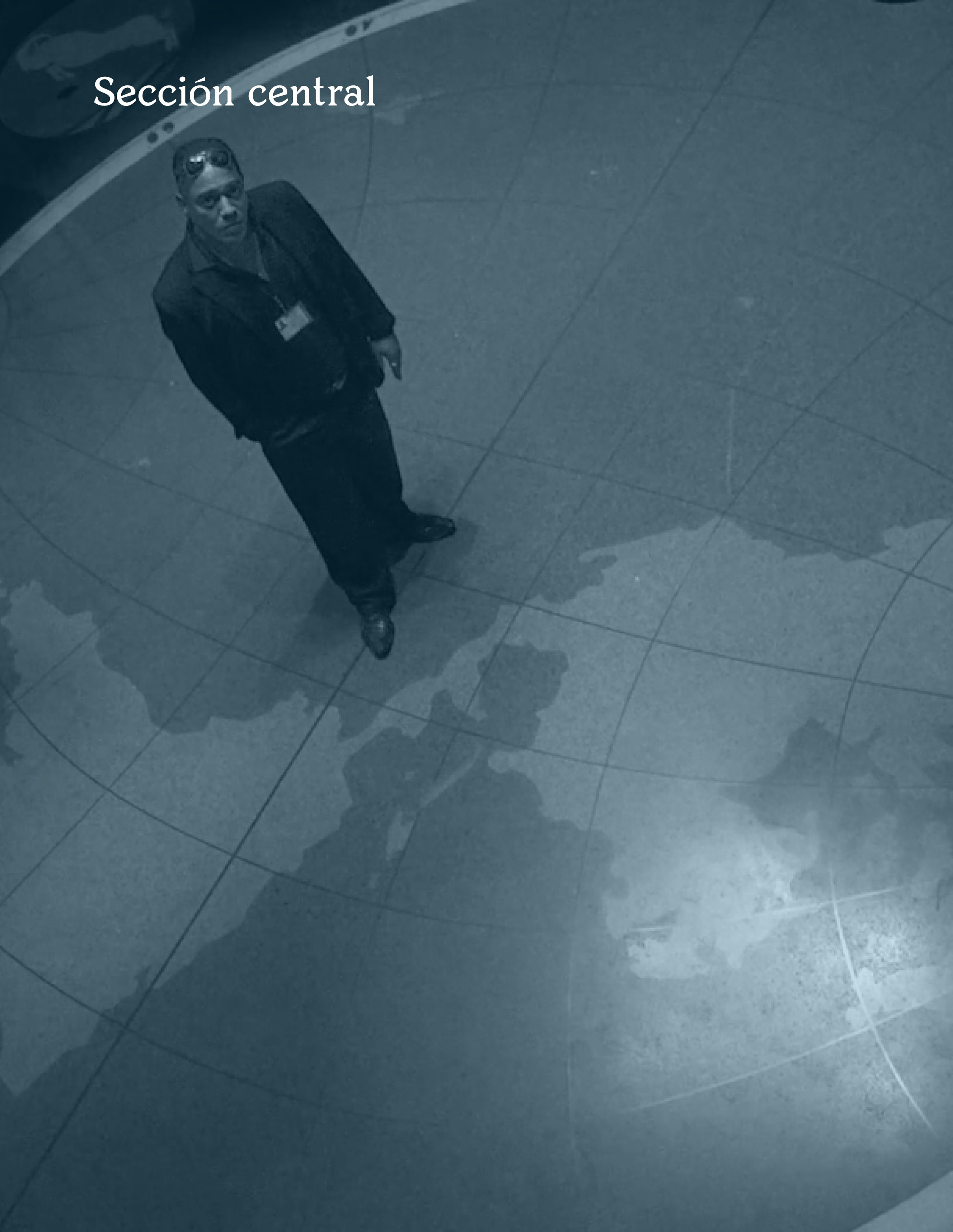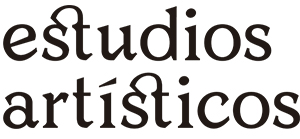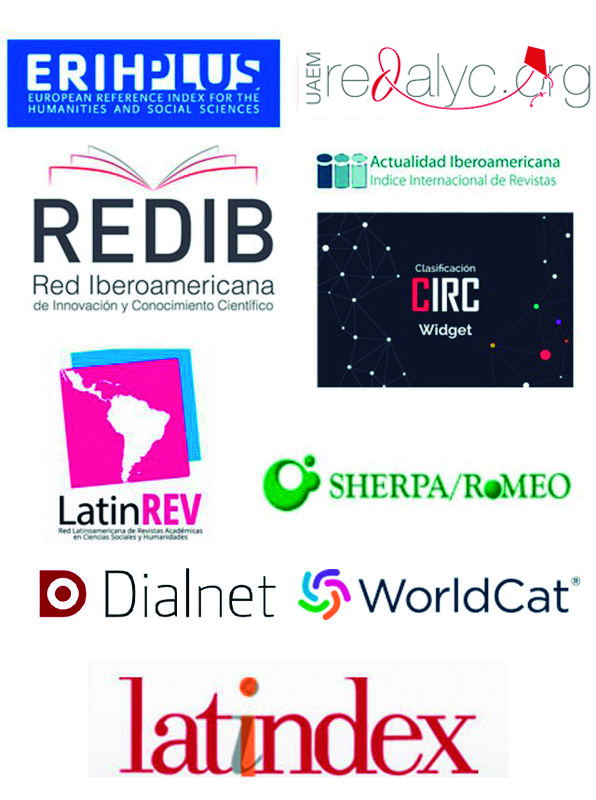
DOI:
https://doi.org/10.14483/25009311.21513Published:
2023-12-24Issue:
Vol. 10 No. 16 (2024): Enero-Junio 2024Section:
ArtículosEntre extranjeras y nativas: potencias de imágenes cinematográficas en Epicentro y algunas películas colombianas
Entre estrangeiros e nativos: potências das imagens cinematográficas no epicentro e alguns filmes colombianos
Between foreign and native: power of cinematographic images in Epicentro and in some Colombian films
Keywords:
cinema, foreign, native, image, surreal, utopia, childhood (es).Keywords:
Film, foreign, native, image, surreal, utopia, childhood (en).Keywords:
Cinema, estrangeiro, nativo, imagem, surreal, utopia, infância (pt).Downloads
Abstract (es)
En el presente texto, parto de mi visualización de la película Epicentro (2020) de Hubert Sauper, un austriaco que decidió realizar un documental en La Habana, Cuba. A través de un recorrido por diferentes momentos del filme, reflexiono sobre la relación que tienen las imágenes audiovisuales con esta nación y lo que representa, al igual que acerca de las particularidades que tiene el hecho de que sea un europeo quien filma en un país latinoamericano. Intercaladamente planteo unos paralelos entre el caso de esta película y algunas de la filmografía colombiana que, a mi parecer, permiten aproximarse a ese cruce entre lo nativo, lo extranjero y las imágenes. A lo largo del texto se ejemplifica y reflexiona sobre posibles tensiones y potencias que emergen de dicho cruce.
Abstract (en)
In the present text, I start from my viewing of the film Epicentro (2020) by Hubert Sauper, an Austrian who decided to make a documentary in La Habana, Cuba. Through a journey among different moments of the film, I reflect on the relationship that audiovisual images have with this nation and what it represents, as well as the particularities of the fact that it is a European who films in a Latin American country. Alternately, I raise some parallels between the case of this film and some of the Colombian filmography that, in my opinion, allow us to approach this intersection between the native, the foreign and the images. Along the text, possible tensions and powers that emerge from this intersection are exemplified and reflected on.
Abstract (pt)
Neste texto parto da visualização do filme Epicentro (2020) de Hubert Sauper, um austríaco que decidiu fazer um documentário em Havana, Cuba. Através de um percurso por diferentes momentos do filme, reflito sobre a relação que as imagens audiovisuais têm com esta nação e o que ela representa, bem como as particularidades do facto de ser um europeu quem filma num país latino-americano. Alternadamente, levanto alguns paralelos entre o caso deste filme e alguns da filmografia colombiana que, na minha opinião, nos permitem abordar essa intersecção entre o nativo, o estrangeiro e as imagens. Ao longo do texto, são exemplificadas e refletidas possíveis tensões e potências que emergem dessa intersecção.
References
Arbeláez, C. C. (Director). (2010). Los colores de la montaña [Película]. El Bus Producciones.
Atehortúa Arteaga, F. (Director). (2019). Pirotecnia [Película]. Invasión Cine.
Gómez, P. P. (2017). Marta Rodríguez, descolonizando la representación documental latinoamericana. Estudios Artísticos: revista de investigación creadora, 3(3), pp. 119-135.
Guerra, C. y Gallego, C. (Directores). (2018). Pájaros de verano [Película]. Ciudad Lunar Producciones;
Blond Indian Films; Pimienta Films; Snowglobe Films; Films Boutique; Ibermedia.
Guimarães, V. (31 de julio de 2023). Surrealism: Rethinking Documentary From a Latin American Perspective. ida international documentary association. https://www.documentary.org/online-feature/sur-realism-rethinkingdocumentary-latin-american-perspective#
Quijano, A. (1990). Estética de la utopía en CLACSO (Ed.), Cuestiones y horizontes: de la dependencia
histórico-estructural a la colonialidad/descolonialidad del poder. (1 ed., pp. 733-741). CLACSO.
Rodríguez, M. y Silva, J. (Directores). (1982). Nuestra voz de tierra, memoria y futuro [Película]. Fundación
Cine Documental; ICAIC.
Sánchez Villarreal, F. (7 de octubre de 2021). “Me interesa lo que une al virus y el espectro”:
Apichatpong Weerasethakul, director de ‘Memoria’. Canal trece. https://canaltrece.com.co/noticias/me-interesa-lo-que-une-al-virus-y-el-espectro-apichatpong-weerasethakul-director-de-memoria/
Sauper, H. (Director). (2020). Epicentro [Película]. Groupe Deux; KGP Kranzelbinder Gabriele Production; Little Magnet Films.
Zuluaga, P. A. (26 julio de 2020). PARTE I: Construcción social del gusto, economías del prestigio y contiendas dentro del canon en los festivales de cine. Medium. https://medium.com/cinestesia/parte-i-construcci%C3%B3n-social-del-gusto-econom%C3%ADas-del-prestigio-y-contiendas-dentro-del-canon-en-6e1f1b907b67
Zuluaga, P. A. (9 de agosto de 2020). PARTE II: Construcción social del gusto, economías del prestigio y contiendas dentro del canon en los festivales de cine. Medium.https://medium.com/cinestesia/parte-ii-construcci%C3%B3n-social-del-gusto-econom%C3%ADas-del-prestigio-y-contiendas-dentro-del-canon-en-64d2b45e8401
Weerasethakul, A. (Director). (2021). Memoria[Película]. Kick the Machine; Burning Blue; Piano Producciones; Illuminations Films; Anna Sanders Films
How to Cite
APA
ACM
ACS
ABNT
Chicago
Harvard
IEEE
MLA
Turabian
Vancouver
Download Citation
License
Copyright (c) 2023 Estudios Artísticos

This work is licensed under a Creative Commons Attribution-NonCommercial-ShareAlike 4.0 International License.

Este obra está bajo una licencia de Creative Commons Reconocimiento 4.0 Internacional.
The ESTUDIOS ARTÍSTICOS Journal exposes the guidelines on good practices in scientific publication, as a framework for the development and implementation of its own policies and ethics system in the publication. The Editors of the journal ARTISTIC STUDIES, select the reviewers under guidelines of impartiality and professionalism, so that they can ensure fair evaluations, the Editors guarantee the authors that the appropriate reviewers are selected for revisions of their works, and readers can trust the peer review process.
The ESTUDIOS ARTÍSTICOS Editors are aware of the work necessary to make firm decisions and the creation of solid editorial processes, designed to manage their interests and promote an efficient and sustainable publishing system, which will benefit academic institutions, publishers of journals, the authors, those who finance the research and the readers. Good practices in scientific publication do not develop spontaneously but are consciously established and actively promoted.
Responsibilities of the authors of the works
All the authors that are reflected in the work must have actively contributed to it.
ESTUDIOS ARTÍSTICOS provides the authors with clear instructions explaining the concepts of academic authorship, specifying that the contributions should be clear. The editors of ARTISTIC STUDIES request the declaration to the authors that they meet the criteria of the journal in relation to the authorship. In the event of a conflict in the authorship of a published work, the ARTISTIC STUDIES Editors will contact the author who claims their authorship to establish the veracity of the case. If the Editors deem it appropriate, temporary access to the article in question will be closed until a final decision is made.
The documents to be published must not have been published before








